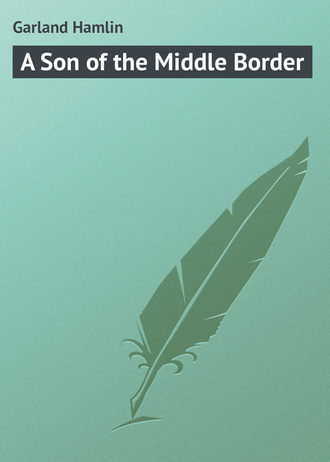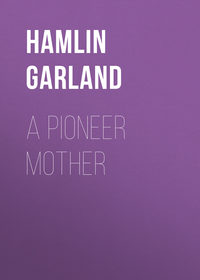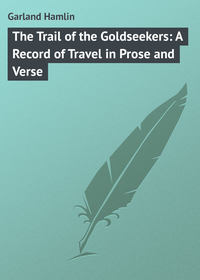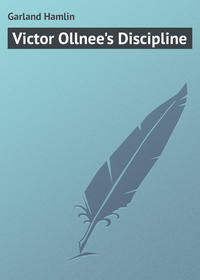 полная версия
полная версияA Son of the Middle Border
One night as we were all seated around the kerosene lamp my father said, "Well, Belle, I suppose we'll have to take these young ones down to town and fit 'em out for school." These words so calmly uttered filled our minds with visions of new boots, new caps and new books, and though we went obediently to bed we hardly slept, so excited were we, and at breakfast next morning not one of us could think of food. All our desires converged upon the wondrous expedition – our first visit to town.
Our only carriage was still the lumber wagon but it had now two spring seats, one for father, mother and Jessie, and one for Harriet, Frank and myself. No one else had anything better, hence we had no sense of being poorly outfitted. We drove away across the frosty prairie toward Osage – moderately comfortable and perfectly happy.
Osage was only a little town, a village of perhaps twelve hundred inhabitants, but to me as we drove down its Main Street, it was almost as impressive as LaCrosse had been. Frank clung close to father, and mother led Jessie, leaving Harriet and me to stumble over nail-kegs and dodge whiffle trees what time our eyes absorbed jars of pink and white candy, and sought out boots and buckskin mittens. Whenever Harriet spoke she whispered, and we pointed at each shining object with cautious care. – Oh! the marvellous exotic smells! Odors of salt codfish and spices, calico and kerosene, apples and ginger-snaps mingle in my mind as I write.
Each of us soon carried a candy marble in his or her cheek (as a chipmunk carries a nut) and Frank and I stood like sturdy hitching posts whilst the storekeeper with heavy hands screwed cotton-plush caps upon our heads, – but the most exciting moment, the crowning joy of the day, came with the buying of our new boots. – If only father had not insisted on our taking those which were a size too large for us!
They were real boots. No one but a Congressman wore "gaiters" in those days. War fashions still dominated the shoe-shops, and high-topped cavalry boots were all but universal. They were kept in boxes under the counter or ranged in rows on a shelf and were of all weights and degrees of fineness. The ones I selected had red tops with a golden moon in the center but my brother's taste ran to blue tops decorated with a golden flag. Oh! that deliciously oily new smell! My heart glowed every time I looked at mine. I was especially pleased because they did not have copper toes. Copper toes belonged to little boys. A youth who had plowed seventy acres of land could not reasonably be expected to dress like a child. – How smooth and delightfully stiff they felt on my feet.
Then came our new books, a McGuffey reader, a Mitchell geography, a Ray's arithmetic, and a slate. The books had a delightful new smell also, and there was singular charm in the smooth surface of the unmarked slates. I was eager to carve my name in the frame. At last with our treasures under the seat (so near that we could feel them), with our slates and books in our laps we jolted home, dreaming of school and snow. To wade in the drifts with our fine high-topped boots was now our desire.
It is strange but I cannot recall how my mother looked on this trip. Even my father's image is faint and vague (I remember only his keen eagle-gray terrifying eyes), but I can see every acre of that rented farm. I can tell you exactly how the house looked. It was an unpainted square cottage and stood bare on the sod at the edge of Dry Run ravine. It had a small lean-to on the eastern side and a sitting room and bedroom below. Overhead was a low unplastered chamber in which we children slept. As it grew too cold to use the summer kitchen we cooked, ate and lived in the square room which occupied the entire front of the two story upright, and which was, I suppose, sixteen feet square. As our attic was warmed only by the stove-pipe, we older children of a frosty morning made extremely simple and hurried toilets. On very cold days we hurried down stairs to dress beside the kitchen fire.
Our furniture was of the rudest sort. I cannot recall a single piece in our house or in our neighbors' houses that had either beauty or distinction. It was all cheap and worn, for this was the middle border, and nearly all our neighbors had moved as we had done in covered wagons. Farms were new, houses were mere shanties, and money was scarce. "War times" and "war prices" were only just beginning to change. Our clothing was all cheap and ill fitting. The women and children wore home-made "cotton flannel" underclothing for the most part, and the men wore rough, ready-made suits over which they drew brown denim blouses or overalls to keep them clean.
Father owned a fine buffalo overcoat (so much of his song's promise was redeemed) and we possessed two buffalo robes for use in our winter sleigh, but mother had only a sad coat and a woolen shawl. How she kept warm I cannot now understand – I think she stayed at home on cold days.
All of the boys wore long trousers, and even my eight year old brother looked like a miniature man with his full-length overalls, high-topped boots and real suspenders. As for me I carried a bandanna in my hip pocket and walked with determined masculine stride.
My mother, like all her brothers and sisters, was musical and played the violin – or fiddle, as we called it, – and I have many dear remembrances of her playing. Napoleon's March, Money Musk, The Devil's Dream and half-a-dozen other simple tunes made up her repertoire. It was very crude music of course but it added to the love and admiration in which her children always held her. Also in some way we had fallen heir to a Prince melodeon – one that had belonged to the McClintocks, but only my sister played on that.
Once at a dance in neighbor Button's house, mother took the "dare" of the fiddler and with shy smile played The Fisher's Hornpipe or some other simple melody and was mightily cheered at the close of it, a brief performance which she refused to repeat. Afterward she and my father danced and this seemed a very wonderful performance, for to us they were "old" – far past such frolicking, although he was but forty and she thirty-one!
At this dance I heard, for the first time, the local professional fiddler, old Daddy Fairbanks, as quaint a character as ever entered fiction, for he was not only butcher and horse doctor but a renowned musician as well. Tall, gaunt and sandy, with enormous nose and sparse projecting teeth, he was to me the most enthralling figure at this dance and his queer "Calls" and his "York State" accent filled us all with delight. "Ally man left," "Chassay by your pardners," "Dozy-do" were some of the phrases he used as he played Honest John and Haste to the Wedding. At times he sang his calls in high nasal chant, "First lady lead to the right, deedle, deedle dum-dum – gent foller after – dally-deedle-do-do —three hands round" – and everybody laughed with frank enjoyment of his words and action.
It was a joy to watch him "start the set." With fiddle under his chin he took his seat in a big chair on the kitchen table in order to command the floor. "Farm on, farm on!" he called disgustedly. "Lively now!" and then, when all the couples were in position, with one mighty No. 14 boot uplifted, with bow laid to strings he snarled, "Already – GELANG!" and with a thundering crash his foot came down, "Honors TEW your pardners – right and left FOUR!" And the dance was on!
I suspect his fiddlin' was not even "middlin'," but he beat time fairly well and kept the dancers somewhere near to rhythm, and so when his ragged old cap went round he often got a handful of quarters for his toil. He always ate two suppers, one at the beginning of the party and another at the end. He had a high respect for the skill of my Uncle David and was grateful to him and other better musicians for their non-interference with his professional engagements.
The school-house which was to be the center of our social life stood on the bare prairie about a mile to the southwest and like thousands of other similar buildings in the west, had not a leaf to shade it in summer nor a branch to break the winds of savage winter. "There's been a good deal of talk about setting out a wind-break," neighbor Button explained to us, "but nothing has as yet been done." It was merely a square pine box painted a glaring white on the outside and a desolate drab within; at least drab was the original color, but the benches were mainly so greasy and hacked that original intentions were obscured. It had two doors on the eastern end and three windows on each side.
A long square stove (standing on slender legs in a puddle of bricks), a wooden chair, and a rude table in one corner, for the use of the teacher, completed the movable furniture. The walls were roughly plastered and the windows had no curtains.
It was a barren temple of the arts even to the residents of Dry Run, and Harriet and I, stealing across the prairie one Sunday morning to look in, came away vaguely depressed. We were fond of school and never missed a day if we could help it, but this neighborhood center seemed small and bleak and poor.
With what fear, what excitement we approached the door on that first day, I can only faintly indicate. All the scholars were strange to me except Albert and Cyrus Button, and I was prepared for rough treatment. However, the experience was not so harsh as I had feared. True, Rangely Field did throw me down and wash my face in snow, and Jack Sweet tripped me up once or twice, but I bore these indignities with such grace and could command, and soon made a place for myself among the boys.
Burton Babcock was my seat-mate, and at once became my chum. You will hear much of him in this chronicle. He was two years older than I and though pale and slim was unusually swift and strong for his age. He was a silent lad, curiously timid in his classes and not at ease with his teachers.
I cannot recover much of that first winter of school. It was not an experience to remember for its charm. Not one line of grace, not one touch of color relieved the room's bare walls or softened its harsh windows. Perhaps this very barrenness gave to the poetry in our readers an appeal that seems magical, certainly it threw over the faces of Frances Babcock and Mary Abbie Gammons a lovelier halo. – They were "the big girls" of the school, that is to say, they were seventeen or eighteen years old, – and Frances was the special terror of the teacher, a pale and studious pigeon-toed young man who was preparing for college.
In spite of the cold, the boys played open air games all winter. "Dog and Deer," "Dare Gool" and "Fox and Geese" were our favorite diversions, and the wonder is that we did not all die of pneumonia, for we battled so furiously during each recess that we often came in wet with perspiration and coughing so hard that for several minutes recitations were quite impossible. – But we were a hardy lot and none of us seemed the worse for our colds.
There was not much chivalry in the school – quite the contrary, for it was dominated by two or three big rough boys and the rest of us took our tone from them. To protect a girl, to shield her from remark or indignity required a good deal of bravery and few of us were strong enough to do it. Girls were foolish, ridiculous creatures, set apart to be laughed at or preyed upon at will. To shame them was a great joke. – How far I shared in these barbarities I cannot say but that I did share in them I know, for I had very little to do with my sister Harriet after crossing the school-house yard. She kept to her tribe as I to mine.
This winter was made memorable also by a "revival" which came over the district with sudden fury. It began late in the winter – fortunately, for it ended all dancing and merry-making for the time. It silenced Daddy Fairbanks' fiddle and subdued my mother's glorious voice to a wail. A cloud of puritanical gloom settled upon almost every household. Youth and love became furtive and hypocritic.
The evangelist, one of the old-fashioned shouting, hysterical, ungrammatical, gasping sort, took charge of the services, and in his exhortations phrases descriptive of lakes of burning brimstone and ages of endless torment abounded. Some of the figures of speech and violent gestures of the man still linger in my mind, but I will not set them down on paper. They are too dreadful to perpetuate. At times he roared with such power that he could have been heard for half a mile.
And yet we went, night by night, mother, father, Jessie, all of us. It was our theater. Some of the roughest characters in the neighborhood rose and professed repentance, for a season, even old Barton, the profanest man in the township, experienced a "change of heart."
We all enjoyed the singing, and joined most lustily in the tunes. Even little Jessie learned to sing Heavenly Wings, There is a Fountain filled with Blood, and Old Hundred.
As I peer back into that crowded little schoolroom, smothering hot and reeking with lamp smoke, and recall the half-lit, familiar faces of the congregation, it all has the quality of a vision, something experienced in another world. The preacher, leaping, sweating, roaring till the windows rattle, the mothers with sleeping babes in their arms, the sweet, strained faces of the girls, the immobile wondering men, are spectral shadows, figures encountered in the phantasmagoria of disordered sleep.
CHAPTER X
The Homestead on the Knoll
Spring came to us that year with such sudden beauty, such sweet significance after our long and depressing winter, that it seemed a release from prison, and when at the close of a warm day in March we heard, pulsing down through the golden haze of sunset, the mellow boom, boom, boom of the prairie cock our hearts quickened, for this, we were told, was the certain sign of spring.
Day by day the call of this gay herald of spring was taken up by others until at last the whole horizon was ringing with a sunrise symphony of exultant song. "Boom, boom, boom!" called the roosters; "cutta, cutta, wha-whoop-squaw, squawk!" answered the hens as they fluttered and danced on the ridges – and mingled with their jocund hymn we heard at last the slender, wistful piping of the prairie lark.
With the coming of spring my duties as a teamster returned. My father put me in charge of a harrow, and with old Doll and Queen – quiet and faithful span – I drove upon the field which I had plowed the previous October, there to plod to and fro behind my drag, while in the sky above my head and around me on the mellowing soil the life of the season, thickened.
Aided by my team I was able to study at close range the prairie roosters as they assembled for their parade. They had regular "stamping grounds" on certain ridges, Where the soil was beaten smooth by the pressure of their restless feet. I often passed within a few yards of them. – I can see them now, the cocks leaping and strutting, with trailing wings and down-thrust heads, displaying their bulbous orange-colored neck ornaments while the hens flutter and squawk in silly delight. All the charm and mystery of that prairie world comes back to me, and I ache with an illogical desire to recover it and hold it, and preserve it in some form for my children. – It seems an injustice that they should miss it, and yet it is probable that they are getting an equal joy of life, an equal exaltation from the opening flowers of the single lilac bush in our city back-yard or from an occasional visit to the lake in Central Park.
Dragging is even more wearisome than plowing, in some respects, for you have no handles to assist you and your heels sinking deep into the soft loam bring such unwonted strain upon the tendons of your legs that you can scarcely limp home to supper, and it seems that you cannot possibly go on another day, – but you do – at least I did.
There was something relentless as the weather in the way my soldier father ruled his sons, and yet he was neither hard-hearted nor unsympathetic. The fact is easily explained. His own boyhood had been task-filled and he saw nothing unnatural in the regular employment of his children. Having had little play-time himself, he considered that we were having a very comfortable boyhood. Furthermore the country was new and labor scarce. Every hand and foot must count under such conditions.
There are certain ameliorations to child-labor on a farm. Air and sunshine and food are plentiful. I never lacked for meat or clothing, and mingled with my records of toil are exquisite memories of the joy I took in following the changes in the landscape, in the notes of birds, and in the play of small animals on the sunny soil.
There were no pigeons on the prairie but enormous flocks of ducks came sweeping northward, alighting at sunset to feed in the fields of stubble. They came in countless myriads and often when they settled to earth they covered acres of meadow like some prodigious cataract from the sky. When alarmed they rose with a sound like the rumbling of thunder.
At times the lines of their cloud-like flocks were so unending that those in the front rank were lost in the northern sky, while those in the rear were but dim bands beneath the southern sun. – I tried many times to shoot some of them, but never succeeded, so wary were they. Brant and geese in formal flocks followed and to watch these noble birds pushing their arrowy lines straight into the north always gave me special joy. On fine days they flew high – so high they were but faint lines against the shining clouds.
I learned to imitate their cries, and often caused the leaders to turn, to waver in their course as I uttered my resounding call.
The sand-hill crane came last of all, loitering north in lonely easeful flight. Often of a warm day, I heard his sovereign cry falling from the azure dome, so high, so far his form could not be seen, so close to the sun that my eyes could not detect his solitary, majestic circling sweep. He came after the geese. He was the herald of summer. His brazen, reverberating call will forever remain associated in my mind with mellow, pulsating earth, springing grass and cloudless glorious May-time skies.
As my team moved to and fro over the field, ground sparrows rose in countless thousands, flinging themselves against the sky like grains of wheat from out a sower's hand, and their chatter fell upon me like the voices of fairy sprites, invisible and multitudinous. Long swift narrow flocks of a bird we called "the prairie-pigeon" swooped over the swells on sounding wing, winding so close to the ground, they seemed at times like slender air-borne serpents, – and always the brown lark whistled as if to cheer my lonely task.
Back and forth across the wide field I drove, while the sun crawled slowly up the sky. It was tedious work and I was always hungry by nine, and famished at ten. Thereafter the sun appeared to stand still. My chest caved in and my knees trembled with weakness, but when at last the white flag fluttering from a chamber window summoned to the mid-day meal, I started with strength miraculously renewed and called, "Dinner!" to the hired hand. Unhitching my team, with eager haste I climbed upon old Queen, and rode at ease toward the barn.
Oh, it was good to enter the kitchen, odorous with fresh biscuit and hot coffee! We all ate like dragons, devouring potatoes and salt pork without end, till mother mildly remarked, "Boys, boys! Don't 'founder' yourselves!"
From such a meal I withdrew torpid as a gorged snake, but luckily I had half an hour in which to get my courage back, – and besides, there was always the stirring power of father's clarion call. His energy appeared superhuman to me. I was in awe of him. He kept track of everything, seemed hardly to sleep and never complained of weariness. Long before the nooning was up, (or so it seemed to me) he began to shout: "Time's up, boys. Grab a root!"
And so, lame, stiff and sore, with the sinews of my legs shortened, so that my knees were bent like an old man's, I hobbled away to the barn and took charge of my team. Once in the field, I felt better. A subtle change, a mellower charm came over the afternoon earth. The ground was warmer, the sky more genial, the wind more amiable, and before I had finished my second "round" my joints were moderately pliable and my sinews relaxed.
Nevertheless the temptation to sit on the corner of the harrow and dream the moments away was very great, and sometimes as I laid my tired body down on the tawny, sunlit grass at the edge of the field, and gazed up at the beautiful clouds sailing by, I wished for leisure to explore their purple valleys. – The wind whispered in the tall weeds, and sighed in the hazel bushes. The dried blades touching one another in the passing winds, spoke to me, and the gophers, glad of escape from their dark, underground prisons, chirped a cheery greeting. Such respites were strangely sweet.
So day by day, as I walked my monotonous round upon the ever mellowing soil, the prairie spring unrolled its beauties before me. I saw the last goose pass on to the north, and watched the green grass creeping up the sunny slopes. I answered the splendid challenge of the loitering crane, and studied the ground sparrow building her grassy nest. The prairie hens began to seek seclusion in the swales, and the pocket gopher, busily mining the sod, threw up his purple-brown mounds of cool fresh earth. Larks, blue-birds and king-birds followed the robins, and at last the full tide of May covered the world with luscious green.
Harriet and Frank returned to school but I was too valuable to be spared. The unbroken land of our new farm demanded the plow and no sooner was the planting on our rented place finished than my father began the work of fencing and breaking the sod of the homestead which lay a mile to the south, glowing like a garden under the summer sun. One day late in May my uncle David (who had taken a farm not far away), drove over with four horses hitched to a big breaking plow and together with my father set to work overturning the primeval sward whereon we were to be "lords of the soil."
I confess that as I saw the tender plants and shining flowers bow beneath the remorseless beam, civilization seemed a sad business, and yet there was something epic, something large-gestured and splendid in the "breaking" season. Smooth, glossy, almost unwrinkled the thick ribbon of jet-black sod rose upon the share and rolled away from the mold-board's glistening curve to tuck itself upside down into the furrow behind the horse's heels, and the picture which my uncle made, gave me pleasure in spite of the sad changes he was making.
The land was not all clear prairie and every ounce of David's great strength was required to guide that eighteen-inch plow as it went ripping and snarling through the matted roots of the hazel thickets, and sometimes my father came and sat on the beam in order to hold the coulter to its work, while the giant driver braced himself to the shock and the four horses strained desperately at their traces. These contests had the quality of a wrestling match but the men always won. My own job was to rake and burn the brush which my father mowed with a heavy scythe. – Later we dug postholes and built fences but each day was spent on the new land.
Around us, on the swells, gray gophers whistled, and the nesting plover quaveringly called. Blackbirds clucked in the furrow and squat badgers watched with jealous eye the plow's inexorable progress toward their dens. The weather was perfect June. Fleecy clouds sailed like snowy galleons from west to east, the wind was strong but kind, and we worked in a glow of satisfied ownership.
Many rattlesnakes ("massasaugas" Mr. Button called them), inhabited the moist spots and father and I killed several as we cleared the ground. Prairie wolves lurked in the groves and swales, but as foot by foot and rod by rod, the steady steel rolled the grass and the hazel brush under, all of these wild things died or hurried away, never to return. Some part of this tragedy I was able even then to understand and regret.
At last the wide "quarter section" lay upturned, black to the sun and the garden that had bloomed and fruited for millions of years, waiting for man, lay torn and ravaged. The tender plants, the sweet flowers, the fragrant fruits, the busy insects, all the swarming lives which had been native here for untold centuries were utterly destroyed. It was sad and yet it was not all loss, even to my thinking, for I realized that over this desolation the green wheat would wave and the corn silks shed their pollen. It was not precisely the romantic valley of our song, but it was a rich and promiseful plot and my father seemed entirely content.









